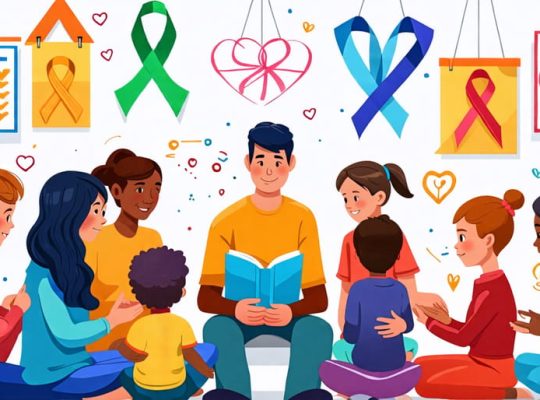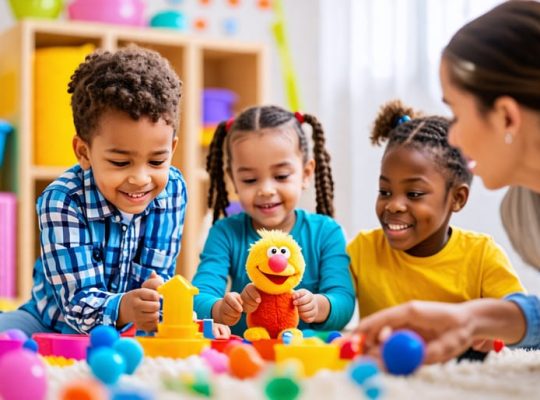Talk to your child’s pediatrician or a mental health professional if you’re concerned about their emotional well-being following a mental health diagnosis. Collaborate with the treatment team to develop a personalized plan incorporating evidence-based therapies tailored to your child’s specific needs. Consider a combination of psychotherapy (such as cognitive-behavioral therapy or family therapy), medication when appropriate, and complementary approaches like mindfulness to support your child’s overall healing and growth. Educate yourself about your child’s condition, treatment options, and strategies to create a nurturing home environment that promotes their mental health and resilience.
Psychotherapy

Cognitive Behavioral Therapy (CBT)
Cognitive Behavioral Therapy (CBT) is a type of talk therapy that helps people change negative thought patterns and behaviors. CBT focuses on the present, teaching children and teens practical skills to manage their emotions and cope with challenges. Through CBT, therapists guide young people in identifying unhelpful thoughts, challenging them, and replacing them with more balanced, positive perspectives. This process can lead to improved mood, reduced anxiety, and healthier behaviors.
CBT is commonly used to treat depression, anxiety disorders, phobias, and post-traumatic stress disorder (PTSD) in children and adolescents. It can also be helpful for managing chronic pain, eating disorders, and sleep problems. CBT sessions are typically structured, goal-oriented, and short-term, often lasting between 12 to 20 weeks. With the support of a trained therapist, CBT can empower children and teens to build resilience, self-awareness, and problem-solving skills that last a lifetime.
Play Therapy
Play therapy is a gentle, effective treatment approach for young children struggling with mental health challenges. Through structured play sessions guided by a trained therapist, children can express their feelings, process difficult experiences, and develop coping skills in a safe, nurturing environment. By engaging with carefully selected toys and activities, children communicate their inner world and work through emotional obstacles at their own pace. Research shows that play therapy can significantly improve emotional regulation, social skills, and overall well-being in children with a range of mental health disorders, including anxiety, depression, and trauma. For parents seeking a compassionate, age-appropriate treatment option, play therapy offers a powerful tool to support their child’s healing and growth. With the guidance of a skilled therapist, play therapy can help children build resilience, strengthen family bonds, and lay the foundation for lifelong mental health.
Family Therapy
Family therapy is often recommended when a child’s mental health challenges are impacting the entire family. By working together with a therapist, families can address unhealthy dynamics, improve communication, and develop coping strategies. Family therapy helps parents better understand their child’s needs and learn ways to support them. It also allows siblings to express their feelings and find their role in the family’s healing process. Through this collaborative approach, family therapy strengthens the family bond and creates a more supportive home environment for the child’s mental well-being. With newfound understanding and tools, families can navigate challenges together and foster a sense of unity and resilience.

Medication
Stimulants
Stimulants, such as methylphenidate and amphetamines, are commonly prescribed to treat Attention Deficit Hyperactivity Disorder (ADHD) in children and adults. These medications work by increasing the levels of certain neurotransmitters in the brain, such as dopamine and norepinephrine, which are crucial for attention, focus, and impulse control. Stimulants can help improve concentration, reduce hyperactivity and impulsivity, and enhance overall functioning in daily life. However, it’s essential to be aware of potential side effects, which may include decreased appetite, sleep problems, irritability, and in rare cases, cardiovascular issues. Close monitoring by a healthcare professional is necessary to ensure the effectiveness and safety of stimulant treatment for ADHD.
Antidepressants
Several types of antidepressants are prescribed for children, including selective serotonin reuptake inhibitors (SSRIs) and serotonin-norepinephrine reuptake inhibitors (SNRIs). These medications work by balancing brain chemicals that affect mood and emotions. While antidepressants can be effective in treating depression and anxiety disorders, it’s essential to monitor children closely for potential side effects and adjust treatment as needed. Some concerns include increased risk of suicidal thoughts, changes in appetite and sleep, and interactions with other medications. Parents should work closely with their child’s healthcare provider to weigh the benefits and risks of antidepressant use and ensure a safe, personalized treatment plan.
Antipsychotics
Antipsychotic medications can be prescribed to children and adolescents to help manage symptoms of certain mental health disorders, such as schizophrenia, bipolar disorder, and severe cases of irritability associated with autism spectrum disorder. These medications work by regulating brain chemicals to reduce hallucinations, delusions, and disorganized thinking. While antipsychotics can be effective in treating these serious conditions, they also come with potential side effects, including weight gain, metabolic changes, and movement disorders. As a parent, it’s crucial to work closely with your child’s psychiatrist to monitor their response to the medication, track any side effects, and make adjustments as needed. Regular check-ins, blood tests, and other assessments are important to ensure your child’s safety and well-being while taking antipsychotics. Remember, every child’s journey is unique, and finding the right treatment plan may take time and patience.
Alternative and Complementary Therapies
Art and Music Therapy
Art and music therapy offer creative outlets for children to express their emotions, process difficult experiences, and develop coping skills. Through drawing, painting, sculpting, or playing music, kids can communicate feelings they may struggle to put into words. These therapies provide a safe, non-judgmental space for self-expression and can help children build self-esteem, improve communication, and enhance emotional regulation. Trained art and music therapists guide children through creative activities tailored to their individual needs, fostering a sense of control and mastery. By engaging in these therapeutic processes, children can gain insight, work through challenges, and develop resilience in the face of mental health struggles.

Animal-Assisted Therapy
Animal-assisted therapy involves supervised interactions with trained animals to improve mental well-being. For children struggling with mental health disorders, spending time with animals can provide comfort, reduce anxiety, and promote emotional regulation. Interacting with friendly dogs, cats, or even horses can help children feel more at ease during therapy sessions, making it easier for them to open up and engage in the therapeutic process. Animal-assisted therapy can also boost self-esteem, enhance social skills, and provide a sense of unconditional acceptance. By incorporating animals into mental health treatment plans, therapists can create a more supportive and engaging environment that encourages children to participate actively in their own healing journey.
Mindfulness and Relaxation Techniques
Mindfulness and relaxation techniques can be powerful tools to help children manage stress and anxiety. Simple practices like deep breathing, progressive muscle relaxation, and guided imagery can teach kids to calm their minds and bodies. Mindfulness activities, such as focusing on the present moment without judgment, can help children develop emotional regulation skills. Incorporating these techniques into daily routines, like bedtime or after school, can make them more accessible and effective. Parents and caregivers can model these strategies and practice alongside their children, fostering a sense of connection and support. By equipping children with these coping mechanisms, we can help them build resilience and promote their overall mental well-being.
The Importance of a Comprehensive Treatment Plan
When it comes to treating mental health disorders in children, a comprehensive, individualized treatment plan is crucial for optimal outcomes. Every child’s needs are unique, and what works for one may not be effective for another. That’s why mental health professionals often recommend a multi-faceted approach that combines different types of therapies tailored to the child’s specific situation.
A well-rounded treatment plan considers the child’s diagnosis, symptoms, strengths, and challenges. It may include a combination of psychotherapy, such as cognitive-behavioral therapy or play therapy, alongside medication when appropriate. Family therapy can also be beneficial, as it helps parents and siblings understand and support the child’s needs.
Additionally, incorporating lifestyle changes, such as regular exercise, a healthy diet, and stress-reduction techniques, can enhance the effectiveness of treatment. Collaborating with the child’s school to implement accommodations and support strategies is another essential component of a comprehensive plan.
The goal is to create a supportive, nurturing environment that promotes healing and growth. By working closely with mental health professionals and actively participating in the treatment process, parents can help their children develop the skills and resilience needed to thrive. Remember, progress may be gradual, and setbacks are normal. With patience, love, and a commitment to following the treatment plan, families can navigate the journey to improved mental health together.
Supporting Your Child’s Mental Health Journey
As a parent, advocating for your child’s mental health is crucial. Start by educating yourself about their specific disorder and available treatments. Don’t hesitate to ask questions and voice concerns to mental health professionals. You are a valuable member of your child’s care team, offering insights into their daily life and progress.
Building a strong, trusting relationship with your child’s therapist or psychiatrist is essential. Share your observations, discuss treatment goals, and work together to create a comprehensive care plan. Attend appointments when possible, and keep open lines of communication.
At home, strive to create a supportive home environment that promotes mental well-being. This may include establishing routines, encouraging healthy habits, and fostering open, non-judgmental communication. Be patient and understanding, as progress may be gradual.
Encourage your child to express their feelings and listen without criticism. Validate their experiences and remind them that seeking help is a sign of strength. Celebrate their successes, no matter how small, and offer unconditional love and support.
Remember, taking care of your own mental health is equally important. Seek support from family, friends, or mental health professionals when needed. Joining a support group for parents of children with mental health disorders can provide valuable resources and a sense of community.
Advocating for your child’s mental health is an ongoing journey. Stay informed, stay involved, and prioritize both your child’s well-being and your own. With the right support and treatment, your child can thrive and lead a fulfilling life.







